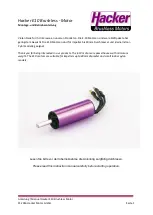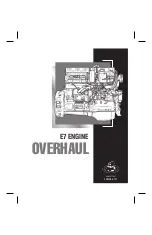
22
All internal-combustion engines benefit, to some
degree, from extra care when they are run for the first
few times known as running-in or breaking-in.
This is allows the working parts to mate together
under load at operating temperature.
However, because O.S. engines are made with the
aid of the finest modern precision machinely and from
the best and most suitable materrials, only a very
short and simple running-in procedure is required and
can be carried out with the engine installed in the
model. For the first few flights with a new engine i.e.
while the engine is being run-in set the needle-
valve for a slightly rich mixture not excessively rich
as this may result in poor throttle response and cause
the engine to stope. About one half turn open from
the nomal setting will usually suffice.
RUNNING-IN ("Breaking-in")
ー
ADJUSTMENT
Please observe the following before beginning to
make any adjustment.
High-Speed Needle Valve. Turn this approximately
30 degrees (3 to 4 click) at a time, when making
initial adjustments; then in steps of approximately
15 degrees (1 to 2 clicks) when making final
adjustments.
Medium-Speed Needle Valve. Turn approximately
30 degrees (3 to 4 click) at a time.
Idle Mixture Control Screw. Turn approximately 5
degrees at a time. It turns approximately 90
degrees both side from the center. Turn left to
enrich the idle mixture and turn right to lean the idle
mixture.
23
The general course of adjustment procedure is
shown in the ADJUSTING CHART and is correct
for a fuel containing 20% lubricant and 15-30%
nitromethane.
Bear in mind that fuels containing relatively large
percentages of power-boosting nitromethane operate
at richer mixture settings than are needed for mild
fuels and will, therefore, require the High-Speed
Needle Valve to be readjusted accordingly. The type
and percentage of lubricant used is also a factor
here, as noted later in these instructions.
As a safety measure, first check the transmitter
controls, including the throttle stick and trim lever
positions, and hold the main rotor securely before
starting the engine.
This carburetor is not equipped with a throttle
stop screw. Instead, idling speed is adjusted
by means of the throttle trim lever on the
transmitter.
Warm the engine by allowing it to idle for about 30
seconds. If the engine stops, advance the throttle
trim lever slightly to increase the idle rpm. Then
open the throttle sufficiently to 'float' the model
above the ground. lf, at this time, the engine is
slow to pick up and produces an excess of
exhaust smoke, the mixture is too rich. Correct
this condition by turning the Mixture Control Screw
clockwise 5 degrees. lf the mixture is extremely
rich, engine rpm will become unstable: opening
the throttle will produce a great deal of smoke and
rpm may drop suddenly or the engine may stop.
This condition may also be initiated by an
excessively prolonged warming-up period. lf, on
the other hand, the mixture is too Iean, this wiIl be
indicated by a marked lack of exhaust smoke and
a tendency for the engine to cut out when the
throttle is opened. ln this case, turn the Mixture
Control Screw counter-clockwise 5 degrees to
enrich the mixture.
ADJUSTMENT PROCEDURE
1.








































